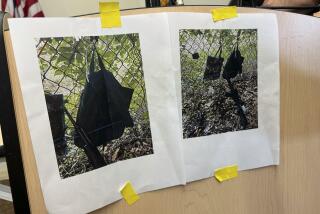Call a Terrorist a Terrorist
- Share via
Why is the U.S. government in as much denial about the motives and label we should apply to Hesham Mohamed Hadayet as the man’s clueless wife, who still can’t bring herself to admit he even committed the crime?
The Egyptian, carrying two handguns and a 6-inch knife, opened fire at the Israeli national airline’s counter at Los Angeles International Airport on our Independence Day. The FBI has only just conceded that he probably went into the terminal with the intent to kill. But the agency still isn’t sure what his motives were.
The nation’s top investigators are still weighing whether the shooting might have been a work dispute, a personal argument or, alas, perhaps a hate crime.
This willful ignorance toward terrorists in our midst is not new. As Middle East Forum Director Daniel Pipes pointed out, Hadayet’s crime “fits a well-established pattern,” and a disturbing one.
There was Rashid Baz, the Lebanese who opened fire on a van of Hassidic Jews in New York City in 1994.
The FBI called that “road rage.”
Then there was a Palestinian professor from Gaza City, Ali Hasan Abu Kamal, who shot seven tourists--killing one--on top of the Empire State Building. He was classified as a “deranged individual working on his own.”
Finally, there was Gamil El Batouty, the Egypt Air copilot who crashed a plane full of passengers leaving John F. Kennedy Airport in 1999. Egyptian pressure forced the National Transportation Safety Board to shy away from mentioning terrorism.
So why all the denial? Because Hadayet, like Batouty, Kamal and Baz, is getting lost in the politically correct fog in part created by a word that has surfaced more than once with regard to the LAX incident.
Upon hearing the news of the attack, Gov. Gray Davis remarked: “Like all Californians, I am outraged and deeply saddened to learn of today’s shooting.... That it happened on the day on which we honor what America stands for--liberty, security and diversity--makes this particularly more tragic.”
The operative word here is, of course, “diversity.” Interestingly enough, it appeared again in discussions of the LAX incident when the press reported that Hadayet had been allowed to stay in this country when his wife was granted permanent residency through the Department of State’s Diversity Lottery Program.
The political power of diversity is threatening to blind us to the very real terrorist threat in our midst, and all because it has created an atmosphere in which law enforcement agencies, including the admittedly often incompetent FBI, would sooner bend over backward to exonerate a person of Middle Eastern descent than be accused of racial profiling.
Like a strangely reverse paranoid glasnost, the diversity orthodoxy on matters of race existed well before Sept. 11, but it certainly has worsened since. The attacks were followed by months of debate about whether one man’s terrorist was another man’s freedom fighter.
Is it any wonder then that we don’t know a terrorist when we see one or can’t bring ourselves to label him as such for fear of, as New York Times columnist Nicholas D. Kristof recently said, “pick[ing] up racist and xenophobic threads that are some of the sorriest chapters in our history”?
This has resulted in a willful blindness to a very real local threat, and all for fear of the powerful stigma now attached to anyone who advocates stricter immigration codes.
Diversity is and always has been a distinctively American practice of which we should be proud. But whether we admit it or not, we are at war with terrorists, and it is not a one-sided war. The troops are marshaling on the other side, and as we have seen all too often of late, they are mostly surfacing behind enemy lines in our backyard.
Denial at this point is suicide, and, for now, blind slavishness to some vacuous ideal of diversity is a luxury we cannot afford.
More to Read
Sign up for Essential California
The most important California stories and recommendations in your inbox every morning.
You may occasionally receive promotional content from the Los Angeles Times.










